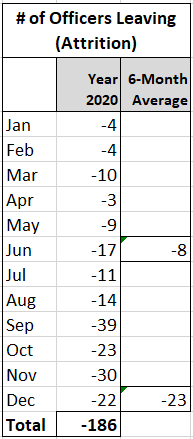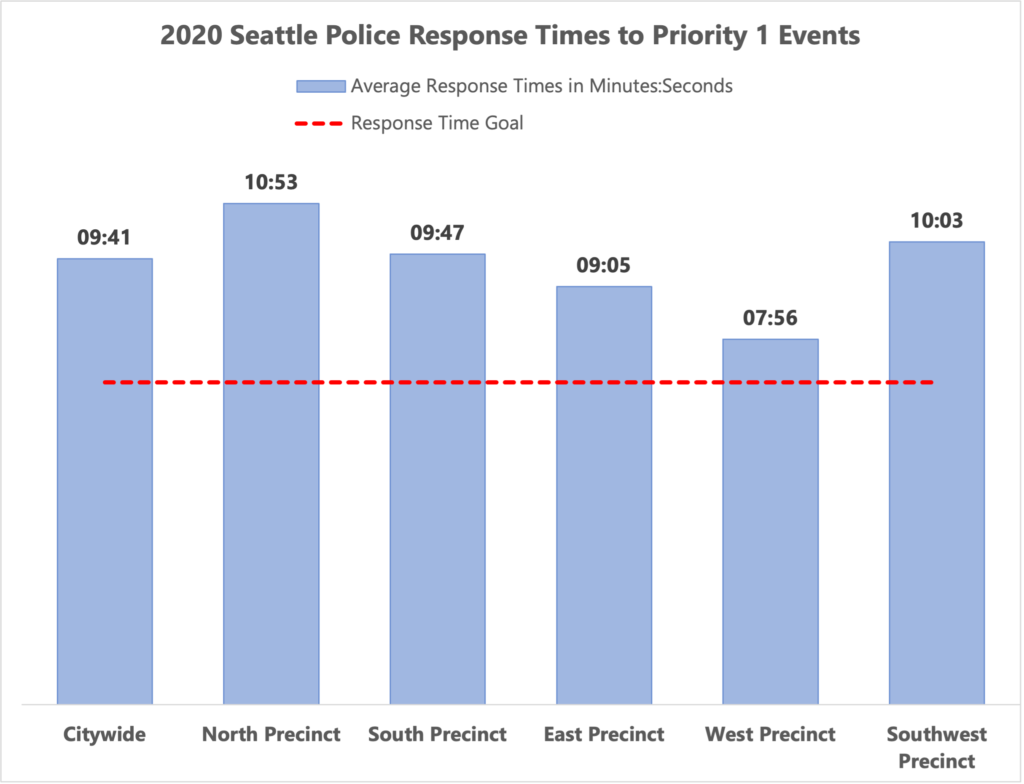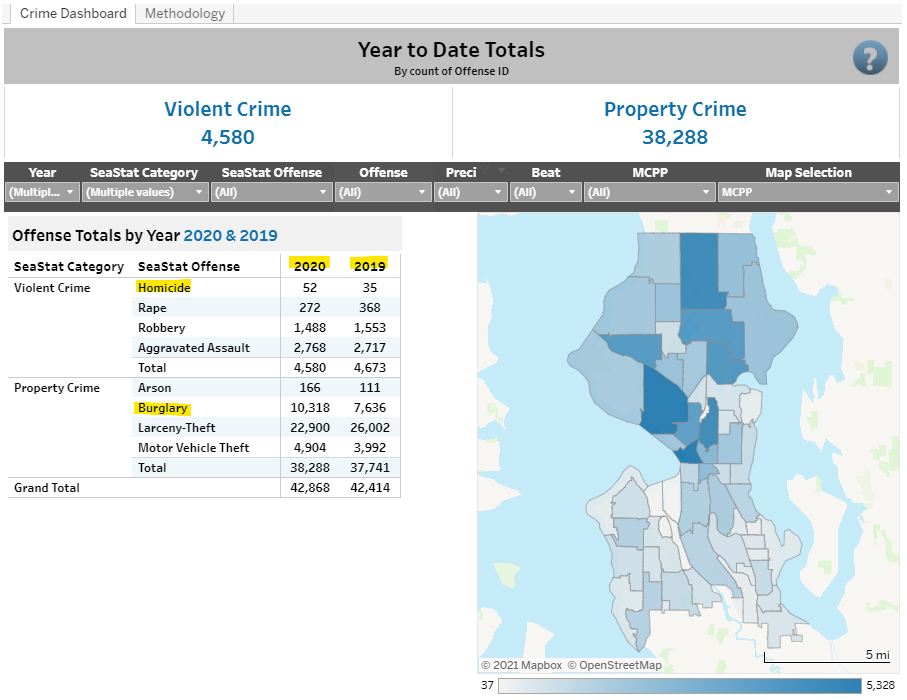12 Reasons to Oppose More Cuts to Seattle Police At This Time: No on Council Bill 119981

JUNE 1, 2021 UPDATE: Council Bill 119981, thankfully, failed by a vote of 3 to 6. Councilmembers who voted against the bill had various reasons for voting NO, as explained in an article by SCC Insight: CLICK HERE. Here are my reasons:
Councilmember Alex Pedersen’s Statement on City Council Narrowly Rejecting Council Bill 119981 on June 1, 2021
“I’ve worked hard to be clear and consistent for my constituents: at this time, I cannot support additional cuts to public safety until effective alternatives are in place. This Council Bill is complex but, at the end of the day, it continues to reduce resources from our police department at a time when we are seeing record-breaking attrition of officers, so I will be voting No. I believe it’s premature to label the loss of police officers through attrition as budgetary “savings” that can be immediately scooped away and spent elsewhere. The record-breaking attrition of officers is alarming and response times to priority 911 calls are too long. By the end of the year, I want to be sure the department has the funds it needs to hire more crime prevention officers, to retain good officers, to ramp up recruitment of diverse and progressive officers, to implement the federal consent decree and heed the warnings of the federal judge and his monitor, to increase training, and to return experienced officers to their community policing work instead of working overtime on patrol. Yes, let’s lift the budget provisos to free up some of the dollars, but not by cutting more with the other hand.
“While I believe the intentions of the sponsors of the bill were positive, this bill has become a distraction since its conception six months ago. Despite the hard work of the Committee Chair to craft a compromise and the well-intentioned amendments, I believe this bill not only sends an unproductive and negative message to the remaining city government workers in the public safety field who are already stretched thin, but also steals time and attention away from the most impactful task at hand for justice and reform — and that’s revamping the inflexible and expensive contract with the Seattle Police Officers Guild. Let’s get back to supporting the work of our Labor Relations Policy Committee, so they can revise the police contract in a way that is positive for the community, for the officers, for the budget, and for sustainable and systemic justice. Thank you.”
FEBRUARY 11, 2021 (ORIGINAL POST):
After carefully considering Council Bill 119981, I issued the following statement the morning of Tuesday, February 9, 2021 prior to the start of the Seattle City Council’s Public Safety Committee meeting:
- “I will continue to demand accountability from our police department and to attack institutional racism and, at the same time, I am deeply concerned that several City Council colleagues are considering harsher cuts to our Seattle Police Department with Council Bill 119981 — even after an alarming number of SPD officers are leaving the department and before we have a detailed public safety plan. Let’s allow the time to receive research results and put in place proven emergency response safety alternatives – such as hiring enough mental health professionals to respond to certain crisis calls 24/7.”
- “Cutting more now and asking questions later is reckless and sends the wrong message that City leaders may be shirking their paramount duty to provide public safety under our Seattle City Charter.”
- “I will continue to implore my colleagues not to cut more from our public safety systems until we have plans and programs in place and to focus instead on revamping the expensive and inflexible police union contract that expired several weeks ago and to ask our State lawmakers to end harmful arbitration by supporting State Senate Bill 5134 (endorsed by the ACLU) instead of acquiescing to bills that are weaker on police reform.”
To reinforce my current stance on this important matter, here are 12 reasons to oppose further cuts to our Seattle Police Department at this time:
TO DELIVER JUSTICE AND SAVE MONEY, REVAMP THE POLICE CONTRACT — it’s expired! Instead of bumper sticker slogans and blunt budget cuts, my research led me to conclude the true path to delivering justice, enhancing safety, and redeploying savings is to revamp the inflexible and expensive police union contract — which expired weeks ago. Instead of micromanaging the police budget after already cutting it by 20%, the Councilmembers on the Labor Relations Policy Committee should be spending all their spare time getting to the heart of the matter: a police contract worthy of our city’s progressive and practical values to achieve true safety in all communities.
WE NEED A PLAN, NOT A PERCENTAGE: I support funding several proven community safety alternatives to traditional policing, but I did NOT pledge to “defund” SPD by a dramatic 50%, because I concluded that was an impractical and arbitrary number not tied to any specific community safety goals. After last year’s partial defunding of our Seattle Police Department by approximately 20% (which is more than the percentage reduced from the Minneapolis Police Department), some Seattle Councilmembers are disturbingly proposing to cut more: Council Bill 119981 would cut $5.4 million more from our police department’s 2021 Budget. Cutting more now without effective alternatives in place first is reckless.
NEED ALTERNATIVES IN PLACE FIRST: While I voted in favor of reallocating tens of millions of dollars from SPD to other crime prevention strategies, many of those community-driven alternatives are not yet crafted or have not had time to grow to the scale needed to serve Seattle 24/7. We are naturally still awaiting the final results from both the Mayor’s Equitable Communities Initiative Task Force and from the sole-source contract awarded by Council President Gonzalez and Councilmembers Herbold, Mosqueda, and Morales to the local Black Brilliance Project organization(s) . Ideally, those two efforts coordinate with each other, consult a statistically significant number of people impacted by policing, and invest the time necessary to confirm which alternatives and supplements to traditional policing are going to be effective in increasing safety and reducing harm. Therefore, for the safety of all communities, I believe we should not further cut our police staffing before these alternatives and supplements are in place and working well. In addition to a common sense approach to have the replacement in place before you cut more, we’re being instructed by the federal judge who on February 4, 2021 said, “…You can’t simply charge off in a direction without knowing what the consequences are, and having in place plans to replace essential services currently being provided by the police. If you do that, then you start to violate provisions in the court’s consent decree.”
STUDIES SHOW WE HAVE TOO FEW OFFICERS ALREADY: If our City government’s labor negotiators can produce a more efficient police contract soon, we can save money while still retaining a sufficient number of police officers for community safety. Both the 2020 analysis by the Seattle Times and the 2016 consultant report by Berkshire confirmed Seattle has a shortage of officers per capita as compared to other cities. Whenever someone calls 9-1-1 for help from the police, someone has to respond – and that means having sufficient officers available 24 hours a day, 365 days a year able to respond quickly across the 83 square miles of our city.
As reported in The Guardian March 2021, “The Rev Harriet Walden, a Seattle advocate who has long fought for police accountability, said she was worried about rising crime rates and feared defunding efforts could leave some Black communities and victims of violence vulnerable: ‘Crime is escalating … and people aren’t going to get arrested or charged.’ Walden said she supported reforms that made it easier to fire officers who violate policies or brutalize people, but that she didn’t want fewer police overall.”
NEED SUFFICIENT POLICE BUDGET AND STAFF TO COMPLY WITH REQUIRED REFORMS: We need ample positions filled at SPD to implement the reforms of the consent decree required by the Obama-Biden Administrations and over seen by the federal courts (Judge Robart). Even the City Attorney Pete Holmes acknowledged the potential problem with additional reductions to SPD, noting on February 4, 2021 to the federal judge, “The City recognizes that additional, major reductions to SPD’s staffing could threaten to undermine Consent Decree reforms in areas such as supervision, training, and use of force reporting, investigation, and review. The City will work with the Monitor [of the Consent Decree] and DOJ [Biden’s U.S. Department of Justice] to help prevent that outcome.” The Monitoring Plan for compliance with the consent decree reforms filed by Dr. Antonio Oftelie on February 4, 2021 (Item 47) uses similar language: “At the same time, the City recognizes that major reductions to SPD’s funding or staffing could threaten to undermine substantial compliance with the Consent Decree requirements in these areas: supervision; training; crisis intervention; data tracking and analysis; and use of force reporting, investigation, and review.”
NEED SPD STAFF TO COMPLY WITH PUBLIC DISCLOSURE REQUESTS: Cutting more from SPD will make it hard to comply not only with the reforms required by the federal consent decree but also with the good government Public Disclosure Act. On February 9, 2021, the Seattle Times reported on the growing backlogs to public disclosure requests from the media and others seeking police reports, body camera footage, etc. SPD has been asking for more resources to comply with the information requests; therefore, cutting the department’s budget could make it harder to comply with that important sunshine law.
NEED TO RESTORE COMMUNITY POLICING: Due to cuts initiated by a majority of the City Council followed by unprecedented attrition of officers leaving the department, Interim Chief Diaz concluded he needed to divert Community Policing Officers away from their crime-solving and crime prevention duties to staff patrol car shifts that to respond to emergency crimes in progress. We need sufficient staffing and budgets to return the Community Policing Officers to their neighborhoods where their on-the-ground knowledge to recognize crime trends block-by-block and their community connections to prevent spikes in burglaries and other crimes is vital for crime prevention and community safety.
ALARMING ATTRITION:
Despite the need for an adequate number of officers, we are heading in the opposite direction due to attrition (officers leaving). Some have argued that we should not allow SPD to spend the $5.4 million if any of those dollars are needed to for overtime costs because Section 7 of Resolution 31962 stated, “The City Council will not support any budget amendments to increase the SPD’s budget to offset overtime expenditures above the funds budgeted in 2020 or 2021.” Like my colleagues, I have been frustrated by SPD overspending its overtime budget year after year. Assuming we budget sufficient overtime to begin with, requiring SPD to stick to their overtime budget is generally good policy. But we must not ignore the reality of the extraordinary circumstances that have arisen. Since the Council adopted the Resolution in August 2020, the pace of officers departing has nearly tripled with total annual attrition (for the year 2020) breaking a new record at 186 officers departing (with 51 new officers, net decrease is 135).

The main point of that non-binding Resolution, as its title suggests, was establishing “Council’s intent to create a civilian-led Department of Community Safety & Violence Prevention.” That Department would manage the crime prevention and harm-reduction alternatives and supplements to traditional policing once they are crafted and/or scaled up — while our city would still have a reformed and effective police department to deal with violent and other emergencies. Moreover, that same Resolution also stated in Section 4(C) that the Department must “Stay in compliance with the [federally required] consent decree, including maintaining sufficient qualified, first line field supervisors” and Section 4(D) “Make no layoff decisions that conflict with City Charter obligations including the need to maintain adequate patrol staffing in every district.” Since the Council adopted this aspirational Resolution in August 2020, circumstances changed dramatically with (as stated earlier) the pace of officers departing breaking a new record. We should be alarmed that highly trained officers are leaving the department at rates much higher than anticipated last year. Rather than addressing the sudden staffing shortage, Council Bill 119981 would essentially scoop away more dollars that are desperately needed now to fill empty patrol shifts with overtime. Failing to see the sharp changes and acknowledge the new reality of attrition — and the need to backfill lost positions with overtime funding — is a failure to manage our public safety system for the residents and businesses of Seattle.
CITY CHARTER RESPONSIBILITY: Cutting more now but asking questions later is reckless and sends a message that the City Council is shirking its paramount duty to provide public safety. Article VI, Section 1 of the Seattle City Charter states, “There shall be maintained adequate police protection in each district of the City.”
RESPONSE TIMES HAVE SLOWED:
(UPDATE: On March 9, 2021, SPD finally presented their data on police response times at the City Council’s Public Safety Committee, CLICK HERE. This data confirmed the disturbing increase in police response times, as originally posted here on February 11.)
911 response times have jumped to a dangerously high level. As part of our budget sessions last year, I requested a report on 9-1-1 response times because we need that basic data when considering major changes and because there have been valid concerns that budget cuts would negatively impact how quickly police respond to emergency calls. That report was due January 1, 2021, but SPD informed us it would be delivered at the end of February 2021 instead. Fortunately, former Councilmember and Mayor Tim Burgess assembled this vital data himself and published it. The results, thus far, are troubling.

As Burgess, a former police officer, noted in his research, “Priority 1 incidents involve life-threatening crimes in progress such as shootings and stabbings and other assaults, serious injury vehicle collisions, and other highly dangerous situations requiring police immediately. The performance standard is to have an officer on the scene of these highest priority events, on average, within 7 minutes — a very long time if you are seriously injured in a collision, or you’re awakened at night by someone breaking into your home. In 2020, citywide, Seattle officers needed an average of 9 minutes and 41 seconds to arrive on scene for Priority 1 dispatches. As shown in the chart below, Priority 1 average response times failed to meet the 7-minute standard in every police precinct throughout the city.”
SOME CRIME STATS UP: People tend to cherry-pick statistics to make whatever point they want and I’ll try hard not to fall into that trap. I think it is, however, prudent not to ignore crime rates when deciding how to fund or operate our public safety systems. It would be like government regulators ignoring statistics for airplane crashes when deciding whether to change airline safety standards. While I am not currently attributing an increase in certain crime categories in 2020 to the budget cuts made in the second half of 2020, I believe it’s important to consider these trends before making additional cuts to the police department.
- Homicides UP by 49% (per SPD’s Crime Dashboard, see below).
- Violent Crime down by 2%.
- Burglaries up 35%.

LET’S GET THE STATE TO ENACT REFORMS, TOO: Instead of micromanaging the police budget after already cutting it by 20%, we should be encouraging State government legislators to enact police reforms before they adjourn in April. Better baseline police accountability from Olympia strengthen our hand in Seattle because, if the reforms are imposed statewide (like requiring officers to wear body cameras), then we don’t need to negotiate and pay for such common sense measures every time we update the labor contract here in Seattle. We can instead focus on saving money (to retain a sufficient number of officers) and deepening other reforms. Even now, forces across the political spectrum in Olympia are attempting to water-down the strongest police reforms to preserve complex arbitration rules that allow bad cops to stay. We should instead encourage State lawmakers to end harmful arbitration for city employees who carry guns by supporting State Senate Bill 5134 (endorsed by the ACLU) instead of acquiescing to bills (such as Senate Bill 5055) that are clearly weaker on police reform.
Additional Resources:
POLICE BUDGET:
- For Council Bill 119981, introduced by Councilmembers Herbold and Mosqueda on December 10, 2020, to cut the additional $5.4 million, CLICK HERE. This includes links to analysis memos. The Council Bill was scheduled for discussion at both the January 26 and February 9, 2021 Public Safety Committee, but held both times for potential discussion later.
- For February 10, 2021 editorial by the Seattle Times against Council Bill 199981, CLICK HERE.
- For the original December 17, 2020 Seattle Times article on Council Bill 119981, CLICK HERE.
MISDEMEANOR CRIMES: It appears that the proposal to provide an additional defense to those committing misdemeanor crimes has been shelved for now. For my concerns with that proposal, CLICK HERE.
OTHER BLOG POSTS: For my ongoing and high-level support for funding effective alternatives to traditional policing, combating institutional racism, and securing a police contract that saves money and delivers justice, CLICK HERE.
# # #
Posted: February 11th, 2021 under Councilmember Pedersen


